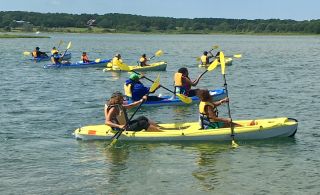Environment
Why You Need to Get Outside and Play
Personal Perspective: The healing benefits of communing with nature.
Posted April 26, 2023 Reviewed by Gary Drevitch

Earth Day was recently celebrated, and yet to many Black folks, it didn't feel like it was for us. Not only do we have a complex history with the land in this country, modern-day proponents of Earth Day – which first took place on April 22, 1970 to raise awareness about the importance of protecting the environment – are not often portrayed or seen as a diverse group of individuals.
But even if it may seem like a “white thing” to celebrate the earth, the natural elements – air, land, water – belong to us, too. It’s critical that we recognize this, take responsibility for Mother Earth and find ways to commune with nature. Without that connection, we lack a vital link to ourselves, our heritage and our well-being.
Our ancestors worked this land and their lives were intertwined with nature. Whether they picked cotton or toiled in tobacco or corn fields, many enslaved Black people worked long hours outdoors from before sunrise to sunset. Today, some Black folks continue in that tradition – from the 45,000 Black farmers who work the land to urban farm initiatives cultivating community connections, job opportunities, educational enrichment, and home-grown healthy food on once-vacant lots throughout the city.
Black folks, although not often recognized, are also leaders of the environmental justice movement – calling attention to the disproportionate impact of pollution and other environmental ills on Black people and other communities of color. We have long borne the brunt of environmental problems, including exposure to lead in water, poor air quality, and proximity to industrial facilities.
One key figure in the movement, for example, is Dr. Mildred “Mama Bahati” McClain, executive director of Harambee House/Citizens for Environmental Justice in Georgia. For decades, McClain has worked to bring attention to the threats of nuclear weapons sites and radiation to people of color. Black activists like her have also emphasized the connection between environmentalism, civil rights, and human rights. Another power player is Ayana Elizabeth Johnson, a marine biologist and environmental justice scholar from Brooklyn, New York. Her many efforts include co-founding the “All We Save Project,” which aims to develop leadership on environmental awareness and climate change, and co-founding the podcast “How to Save a Planet.”
The effects of climate change and global warming – including more severe weather and rising sea levels – hit people of color the hardest. And we are more likely to suffer damage from natural disasters and experience a decrease in wealth as a result. This is why respecting, protecting, and connecting with nature is critical for our mental and physical health. It’s why science tells us we should get outside and play.
.jpg?itok=JogpMqBr)
5 Simple Ways to Commune with Nature
Discover local areas. If you live near a park, hiking trail, or reservoir, plan to visit regularly to take a walk, ride a bike, kayak, picnic, or simply observe your natural surroundings. Find out if there are events such as concerts or festivals held outdoors near you.
Join an outdoor organization. Outdoor Afro is a national not-for-profit organization founded by Rue Mapp. It trains a national volunteer leadership team of nearly 90 men and women who represent 30 states, and shares opportunities to build a broader community and leadership in nature.
Plant a garden. If you have a front yard or backyard space, consider growing vegetables and herbs. Visit your local plant nursery or gardening store to learn about what grows well in your area. The process of clearing weeds, adding soil, planting, and harvesting is a great way to deepen your connection to nature. If you don't have yard space, grow herbs indoors or in a planter box on a windowsill.
Develop a ritual. In your favorite natural spot, take time to wake up your senses to your surroundings. Find a place to sit, get quiet, and take several long, deep breaths. Turn up the volume on your awareness and notice and name what you see, hear, touch, and smell. Consider the sounds of rustling leaves, birds chirping, and creatures skittering up tree trunks or across the grass. Draw your focus to a tree, stand tall, and consider what it must be like to be that tree. Bring a journal to write your reflections.
Consider how the earth, as poet Lucille Clifton writes ...
is a favorite child
of the universe
feel her rolling her hand
in its kinky hair
feel her brushing it clean




